As the sun rises over the beach, Caspian and Edmund awake to find giant footprints in the sand and no Lucy. Drinian notices this too and rouses the rest of the crew so they can follow the prints. Well, not all the rest of the crew. Eustace is left snoring on the shore. For some reason, Reepicheep isn’t among them. I guess he remained on the ship which is odd. Didn’t he say there was honor in turning away from adventure recently?
Meanwhile, in the invisible mansion, Lucy walks down a silent hall to a library in which a giant tome lies on a stand. In the book, her walking down the hall was a great creepy scene with a jump scare moment of her seeing her face in a bearded mirror that was made for cinema. Here it’s over in a matter of seconds. This is the shortest of the three Narnia movies. Would it have hurt it to draw this scene out a little longer? It seems like such a waste.
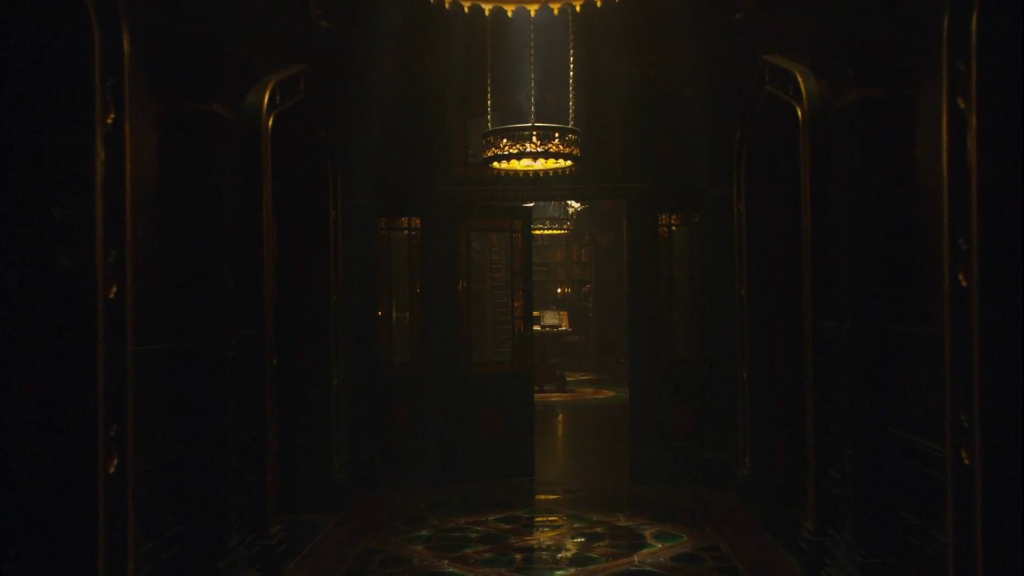
The literary Lucy had a moment of being unable to open the book before realizing it was shut by two leaden clasps. The movie actually gives this a nice whimsical gloss. The letters of books titled are scattered all over the cover[1]In the book, it didn’t have a title by the way. and the (singular) clasp won’t open. Then a little wooden cherub carved into the bookstand comes to life and blows through its lips. Lucy follows its example and blows on the book. At once, the letters rearrange to spell “The Book of Incantations,” a design forms beneath them and the clasp unlocks.
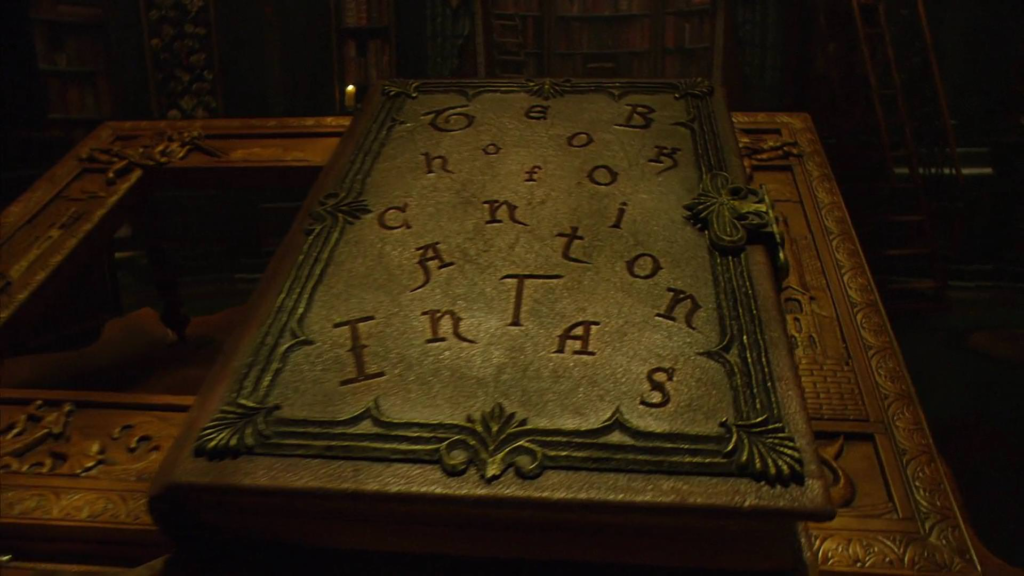
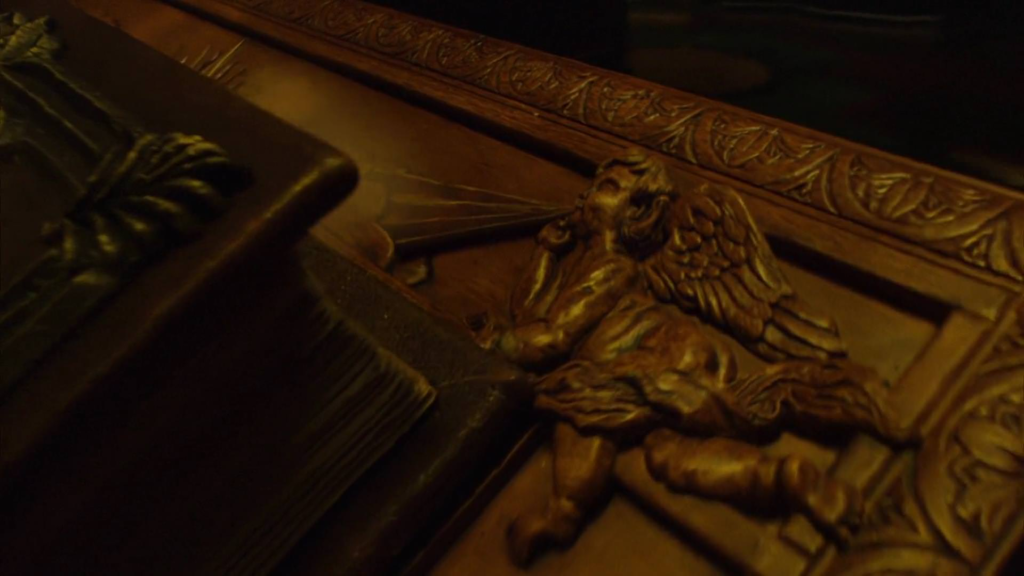
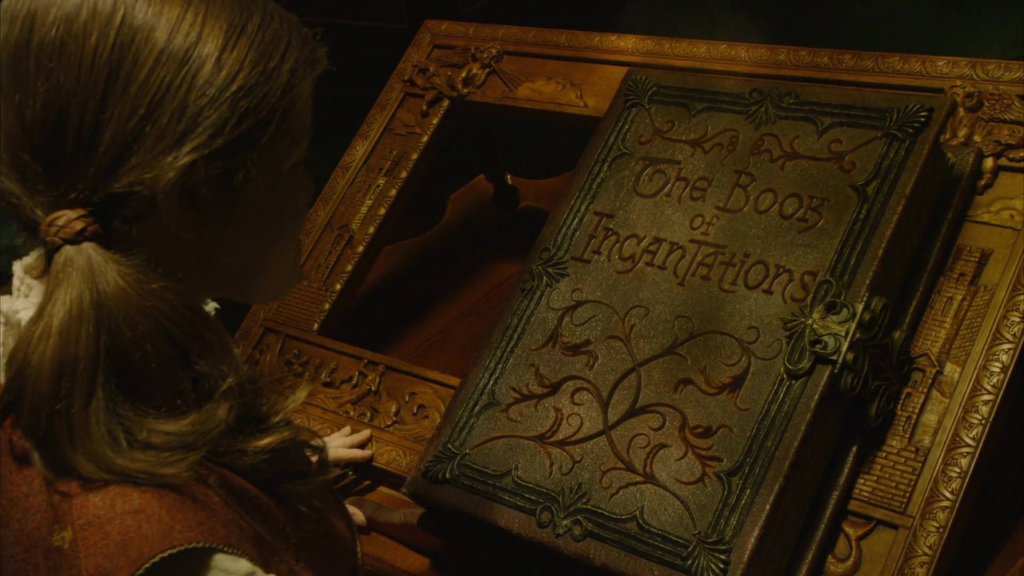
Lucy pages through the book which turns out to be one of my favorite props in any Narnia movie. The detailed illustrations and calligraphy are beautiful, and it perfectly matches C. S. Lewis’s description. There’s a cure for toothache, a spell to remember things forgotten, a spell for forgetting things you want to forget and a cure for warts that involves bathing them in a silver basin by moonlight. If the movie had nothing to recommend it but the design of this book, I would still hesitate to dismiss it.
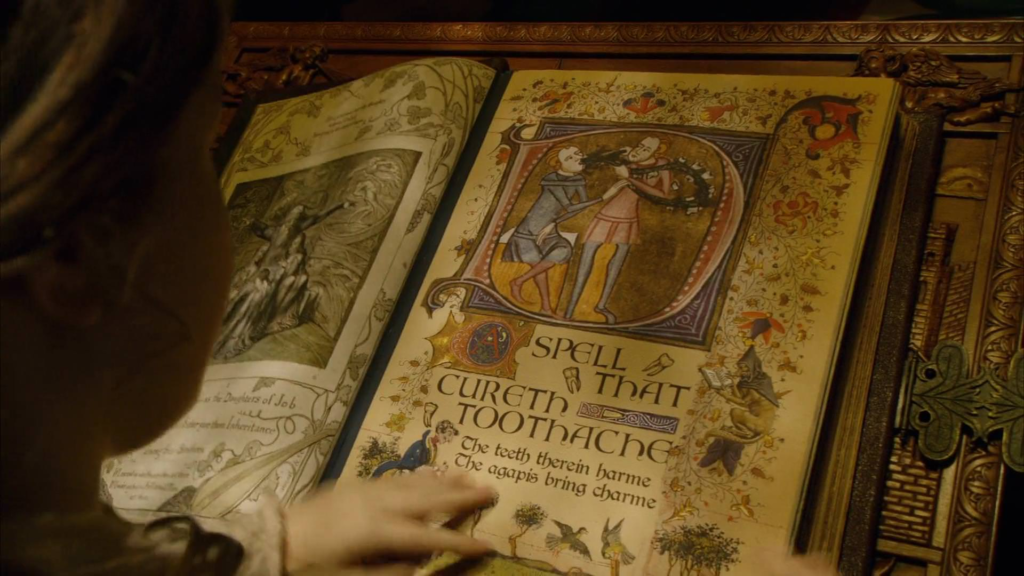
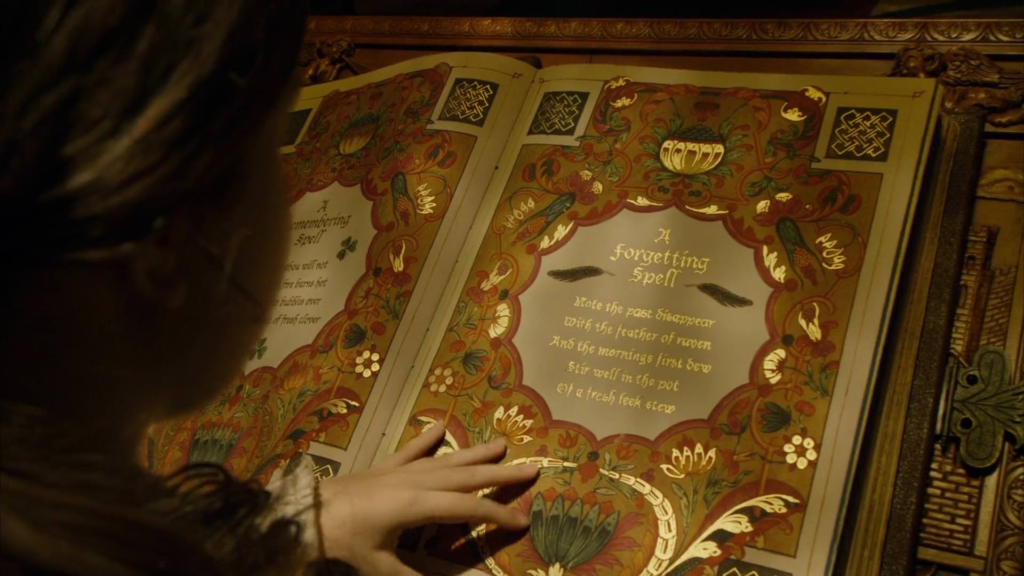
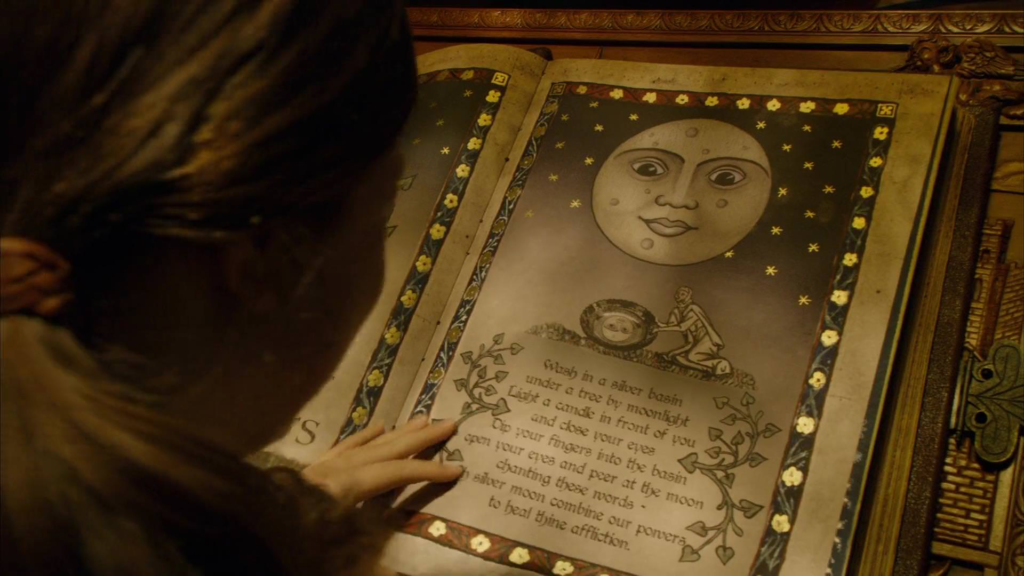
There’s also a spell that’s not in the book. Lucy comes to a page that’s completely black with white text. She reads aloud. “With these words, your tongue must sew for all around there to be snow.” I’m really not sure about the grammar of that poem. Wouldn’t your tongue be sewing the words themselves, not sewing with them? Also, shouldn’t it be sow, not sew? Anyway, a snowflake falls on the page. Lucy looks up to see snow is indeed falling from the ceiling. I really don’t know why she would read this specific page out loud and not others and I’m told this bit is a rip-off of a scene from Harry Potter. Part of me, cynically thinks the movie just did this because the more financially successful of the previous two Narnia movies had snow in it. Still, that moment when the first white snowflake lands on the black page is pretty magical.
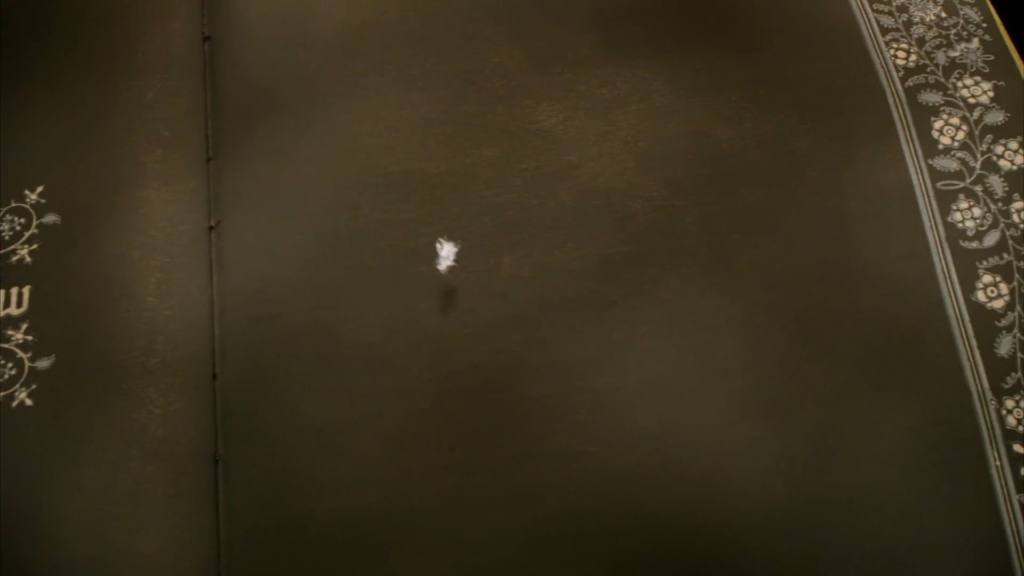
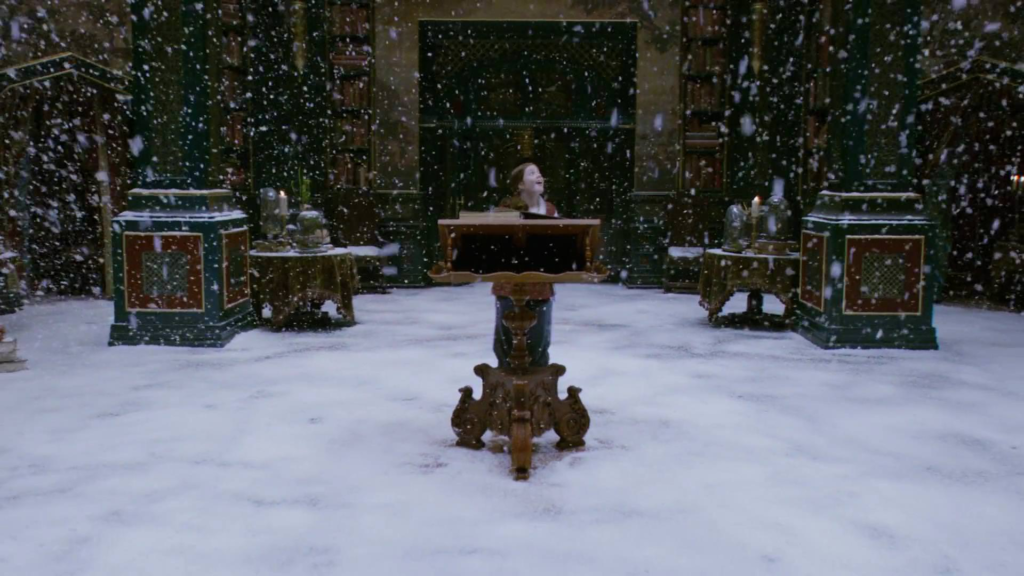
Before long, snow has covered the book. Lucy blows it off and this triggers some kind of magical wind that rapidly flips through the pages. Lucy has to slam her hand down on a page to stop it. For some reason, she doesn’t turn the pages back to see if the spell to make the unseen seen was on one of the pages she missed but continues going through the book. Now, aside from irritating but forgiveable little things like that, I’m really enjoying the scene up to this point. It’s very true to the spirit of the equivalent scene in the book and even true to some of its details. But here we get something that’s not from the book and which I don’t enjoy. When Lucy slams her hand down a page, that silly looking green mist starts to pour out from between the pages. It doesn’t devour Lucy like the sacrificial victims in the longboat at Narrowhaven though. In fact, it’s kind of implied she can’t see it.
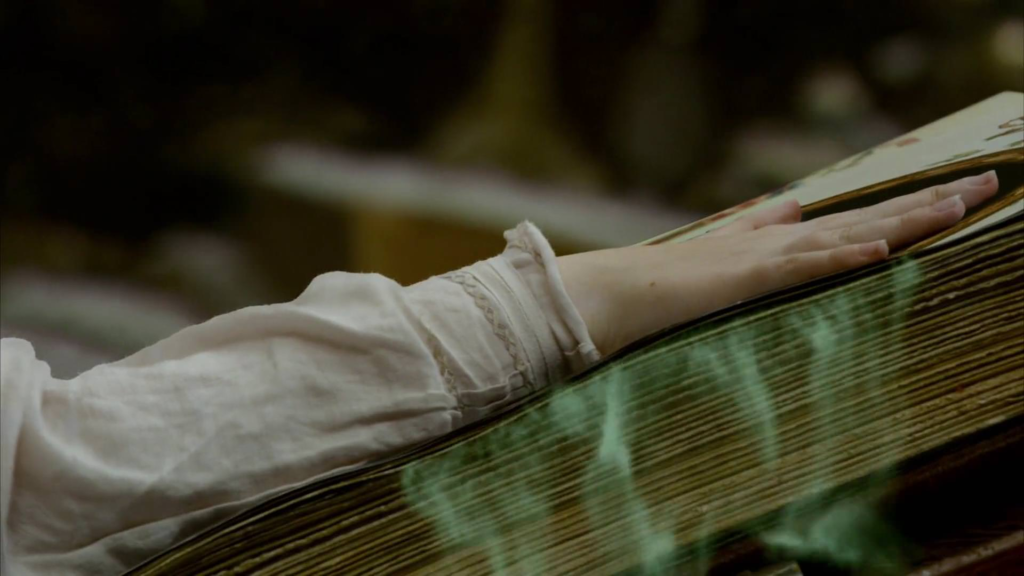
The page Lucy on which Lucy has stopped promises “an infallible spell to make the beauty you’ve always wanted to be.” In the book, this was a spell for “to make beautiful her that uttereth it beyond the lot of mortals,” which is way cooler, but I suppose no actress could live up to it. Ah, well. As Lucy looks at the accompanying illustration of a beautiful woman, it transforms into a mirror. Then her reflection in it shifts so that she looks just like Susan. (By the way, this is one of the most graceful special effects in the movie if you ask me.)
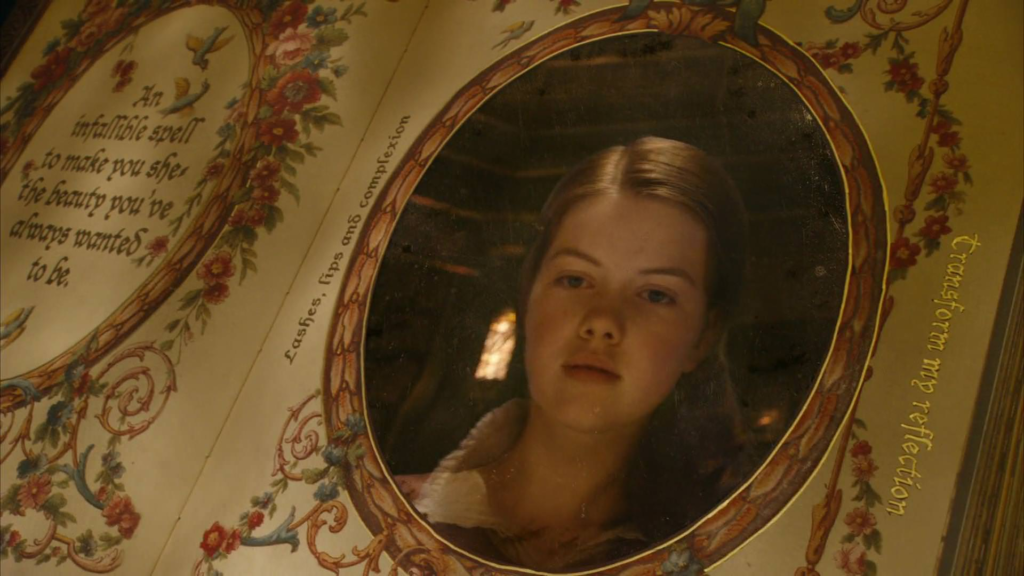
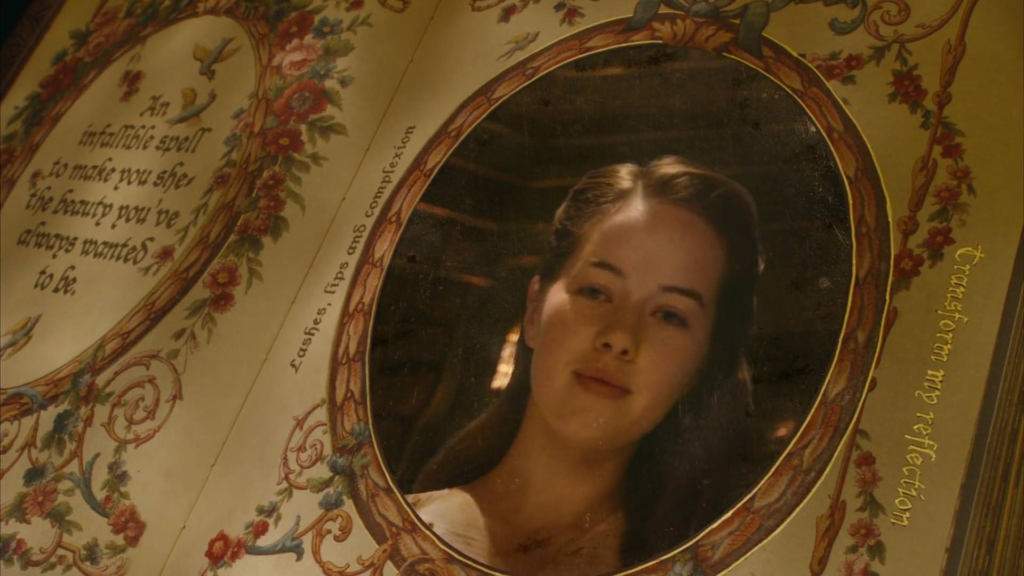
Lucy stares at it, entranced. “I’m beautiful,” she murmurs. I don’t really feel like the movie needed that line. I don’t hate it or anything, but the script had already established that Lucy envies Susan’s looks and the book just told us that this magic spell would makes its caster “the beauty (they’d) always wanted to be.” Those things, coupled with Georgie Henley’s performance were enough to establish that this character considers Susan better looking than herself without her saying, “I’m beautiful” at this point. I feel like if Andrew Adamson, the director of the other Narnia movies, had done this one, he would have cut the line. But Michael Apted seems to have been deeply committed to including every line in the script whether it felt right during filming or not. Lucy runs over to a regular mirror in the room to see if she’s actually transformed into her sister. She hasn’t. By the time, she gets back to the book, the mirror is already fading away. “No, wait!” she says, slamming her hand down on the illustration. She tears out the page with incantation on it. After she does, the pages start rapidly flipping again, this time accompanied by the sound of a roar. The voice of Aslan (Liam Neeson) is heard, saying, “Lucy! Lucy!” He sounds pained. “Aslan?” she calls but she can’t see him anywhere. In C. S. Lewis’s version of this scene, Lucy doesn’t tear out any pages from the book. Instead, just as she’s about to say the beauty spell, an illustration of Aslan’s face growling appears on the page and Lucy turns it in fright. Here, she looks guilty but pockets the stolen page anyway. The pages of the magical book stop turning. Again, Lucy doesn’t turn them back but that makes sense this time as they’ve actually stopped at the very spell that she sought in the first place. As in the book, the spell to make the unseen seen[2]Or “hidden things visible” as the source material phrases it. is on a page with no illustrations (initially), only words. A lot of words actually. The incantation is so long we don’t hear the whole thing in the movie.
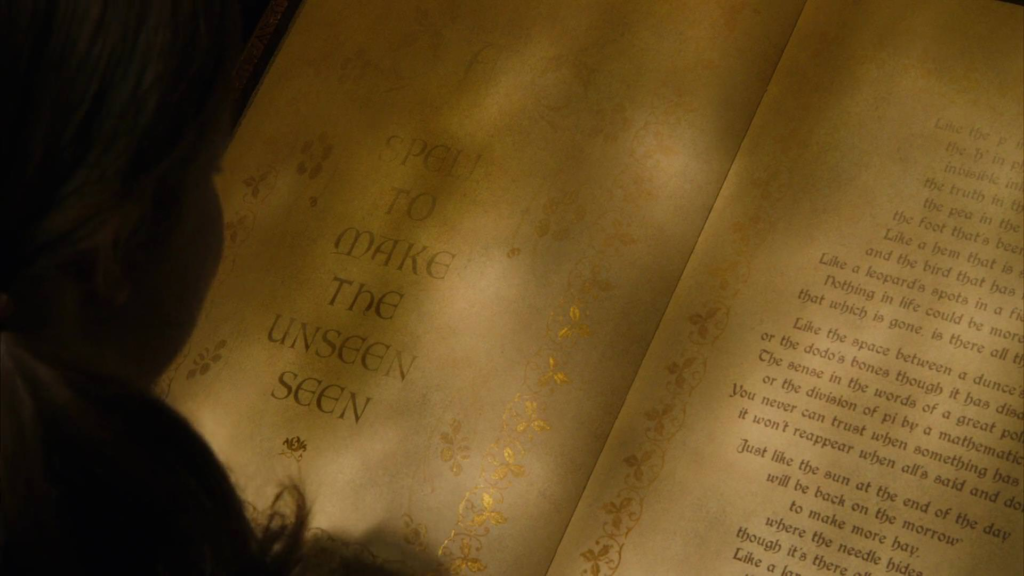
“Like the P in psychology,” Lucy reads, “the H in psychiatry, invisible ink or the truth in theology…”
Wait. What?
It’s no secret that much of the Narnia books’ fanbase is Christian (in America anyway) and Christians would say they do very much see truth in theology. I don’t necessarily think the filmmakers should have pandered to Christians but with the last movie having underperformed at the box office, why alienate part of the fanbase that’s already there? On reflection though, this line actually implies that there is truth in theology, but people don’t see it. Isn’t that offensive to atheists whom the filmmakers also wouldn’t want to offend? What a weird, unnecessary joke. Making it even weirder, it’ll soon become apparent the screenwriters do want to appeal to Christian fans of the books though they only seem to know how to do so in the shallowest way possible. The “truth in theology” line is one of the things that makes this movie’s script feel like a rough first draft to me.[3]I know for a fact that it wasn’t a first draft since pages from a quite different version leaked on the internet at one point but that’s how it feels to me. The sad thing is if it were a first draft, I’d call it a fairly promising one. Much of Eustace’s dialogue is great and much of Caspian’s, Lucy’s and Edmund’s is fine if not particularly memorable. Subsequent drafts could have eliminated unnecessary lines, replaced really cheesy lines[4]We’re getting to some of those. with more eloquent ones, and ironed out confusing plot points and inconsistencies.
Anyway, we cut to Caspian, Edmund and company searching the topiary garden for Lucy. Edmund finds her dagger. Just then, spears start to rain down in front of our heroes. “Stop right there or perish!” says the leader of the voices. The Dawn Treader’s crewmembers find their weapons snatched out of their hands. Invisible enemies knock them down.
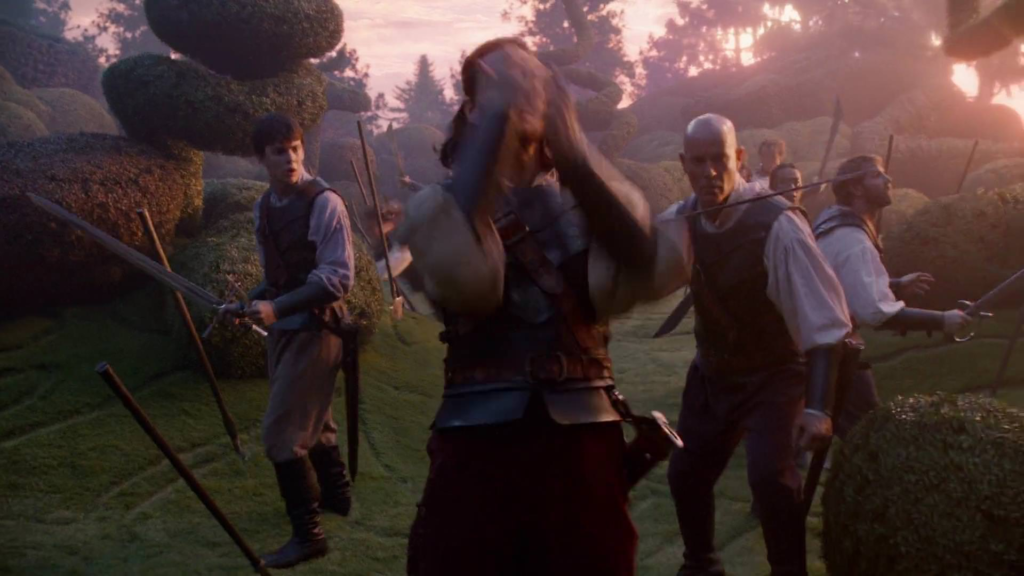
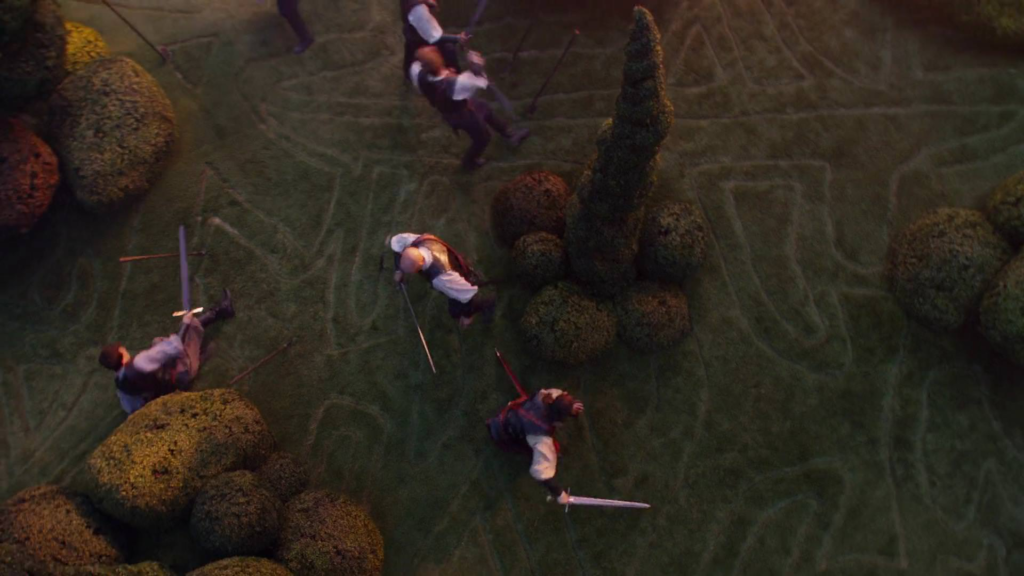
Meanwhile, Lucy finishes the incantation. “The spell is complete. All is visible.” I’d love to know the previous line with which “visible” rhymed. I’d also have loved to have seen the illustrations on the page turn visible, as in the original book, but for some reason, the movie doesn’t do that. Instead, an old, bearded man (Bille Brown) materializes in front of Lucy. Oh no! It’s the Oppressor!
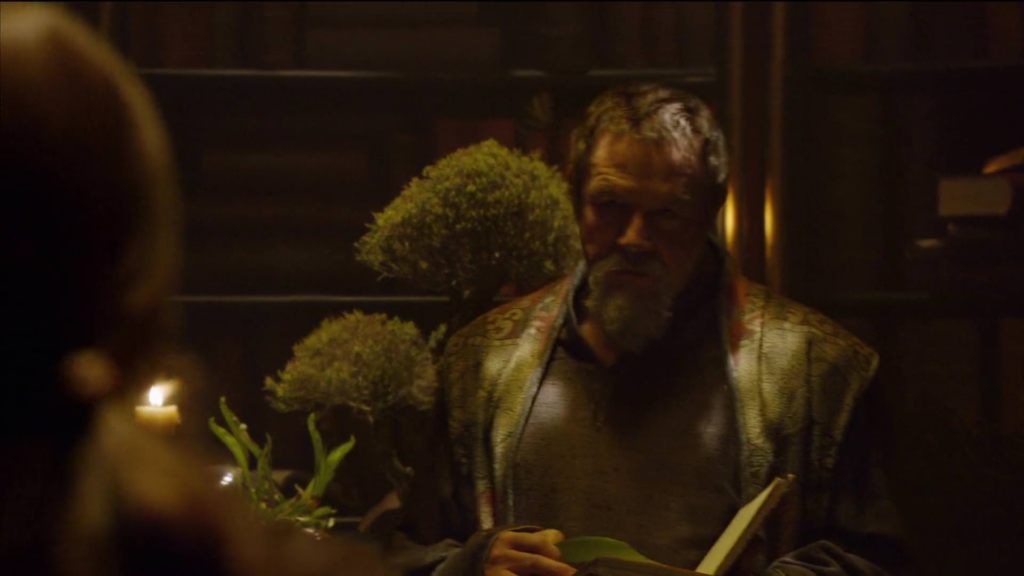
In the book, it’s Aslan whom Lucy meets at this point. The movie hasn’t exactly cut his scene with her though. It’s just moved it to later. I don’t really like the visual of how invisible things become visible in this movie by the way. Instead of fading in reverse, they sort of jerkily materialize with a gloopy sounding noise. It’s hard to explain but it reminds me of science fiction more than fantasy.
We cut back to Caspian. “What sort of creatures are you?” he demands of his opponents.
Voice 1: Big ones. With the head of a tiger and the body of a…
Voice 2: Different tiger.
Voice 1: You don’t want to mess with us.
Edmund: Or what?
Voice 3: Or I’ll claw you to death!
Voice 2: And I’ll run my tuft right through you!
Voice 1: And I’ll gnash you with my teeth!
Voice 4: And I’ll bite you with my fangs!
These threats are undermined by the creatures regaining visibility. They’re revealed to be silly looking dwarfs[5]That’s not a criticism. They’re supposed to look silly., each with a single leg-not like they’ve each lost a leg but like they’re just naturally one-legged-and a gigantic foot. The speakers are all being upheld by others of their species to give the illusion that they’re taller.
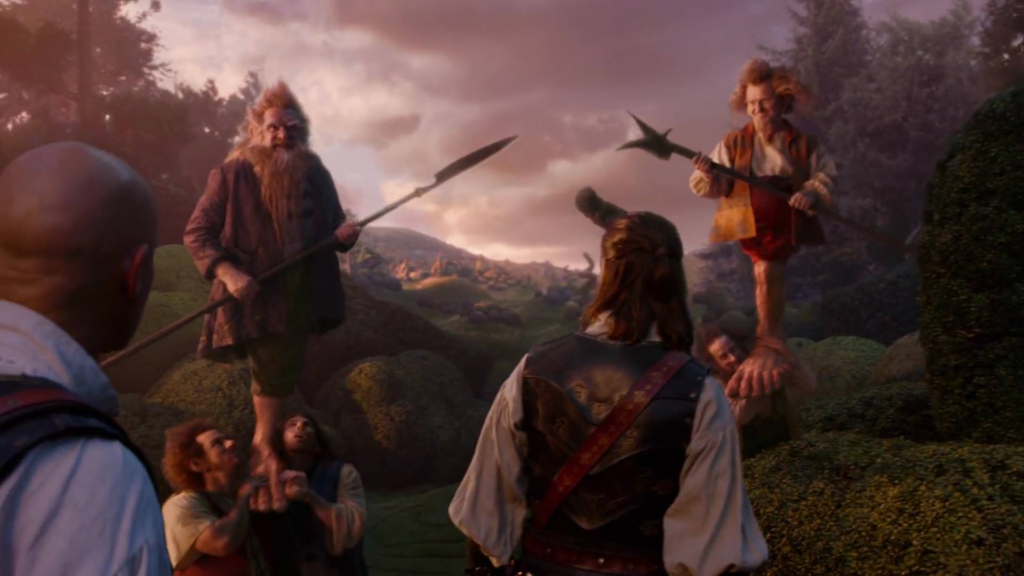
“You mean squash us with your fat bellies?” Edmund asks. “Tickle us with your giant toes?” suggests Caspian. The leader of these dwarfs (the one played by Roy Billing) is dropped, and Edmund puts a sword to his throat. “What have you done with my sister, you little pipsqueak?” he demands. “Where is she?” After some hemming and hawing, the one-legged dwarf answers, “In the mansion.” “What mansion?” asks Edmund. Just then, the house appears near him. “Oh, that mansion,” he says. I feel like that line would be funnier if Skandar Keynes gave it a much drier delivery. Actually, I feel like it would be better if it were just “Oh.” Anyway, Eustace bursts out of the bushes, complaining about being left behind. “It’s the pig!” says one of the creatures upon seeing him. “This place just gets weirder and weirder!” says Eustace. I’m not sure if a boy in his culture would have used the term, weird, in that way but maybe he would have. I’m no expert. Lucy emerges from the mansion with “the Oppressor.” He bows to Caspian and Edmund and addresses one of them-don’t ask me which-as “Your Majesty.” This version of the reveal that he’s a good guy is different from the book’s but I’m fine with it.
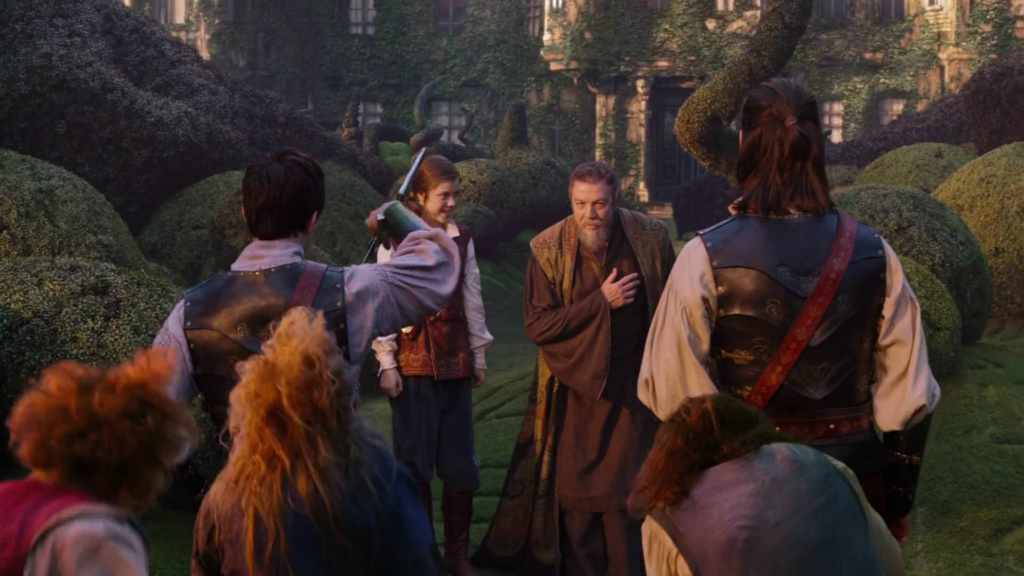
Lucy: Caspian and Edmund, this is Coriakin. It’s his island.
Voice 1: That’s what he thinks! You have wronged us, magician!
Coriakin: I have not wronged you. I made you invisible for your own protection.
Voice 1: Protection?!
Voice 2: That’s oppressive!
Voice 1: Oppressor!
Coriakin: I have not oppressed you.
Voice 1: But you could have if you’d wanted to!
Coriakin: Begone.
He tosses some dust at them and the creatures bounce away in terror on their single legs, looking highly goofy. “What was that?” Lucy asks. “Lint but don’t tell them,” Coriakin replies.
Eustace: What were those things?
Coriakin: Dufflepuds.
Eustace: Right, of course, silly me.
Now in the book, the creatures were originally called duffers, duffer being an old-fashioned insult for a stupid person. Coriakin also didn’t turn them invisible for their protection. Instead, he turned them into giant-footed one-legged beings called monopods, mono meaning one, as punishment for their refusal to obey a perfectly reasonable command. Eventually, the book tells us, their old and their new name were combined into the term dufflepud. If the movie wasn’t going to do that and it’s understandable that they wouldn’t since it’s complicated, I’d rather they just had the puds be called monopods. Dufflepuds, without context, just sounds random. Anyway, in the book, they used Coriakin’s spell book to turn themselves invisible because they couldn’t stand the sight of their new forms but then they got tired of invisibility. There was this hilarious bit of Lucy trying to convince them that Coriakin’s punishment actually improved their appearances.
“And we’re extremely regrettable,” said the Chief Monopod, “that we can’t give you the pleasure of seeing us as we were before we were uglified, for you wouldn’t believe the difference, and that’s the truth, for there’s no denying we’re mortal ugly now, so we won’t deceive you.”
“Eh, that we are, Chief, that we are,” echoed the others, bouncing like so many toy balloons. “You’ve said it, you’ve said it.”
“But I don’t think you are at all,” said Lucy, shouting to make herself heard. “I think you look very nice.”
“Hear her, hear her,” said the Monopods. “True for you, Missie. Very nice we look. You couldn’t find a handsomer lot.” They said this without any surprise and did not seem to notice that they had changed their minds.
“She’s a-saying,” remarked the Chief Monopod, “as how we looked very nice before we were uglified.”
“True for you, Chief, true for you,” chanted the others. “That’s what she says. We heard her ourselves.”
“I did not,” bawled Lucy. “I said you’re very nice now.”
“So she did, so she did,” said the Chief Monopod, “said we were very nice then.”
“Hear ’em both, hear ’em both,” said the Monopods. “There’s a pair for you. Always right. They couldn’t have put it better.”
“But we’re saying just the opposite,” said Lucy, stamping her foot with impatience.
“So you are, to be sure, so you are,” said the Monopods. “Nothing like an opposite. Keep it up, both of you.”
Why couldn’t they be that funny in the movie? Oh well. It’s not like they’re unfunny.
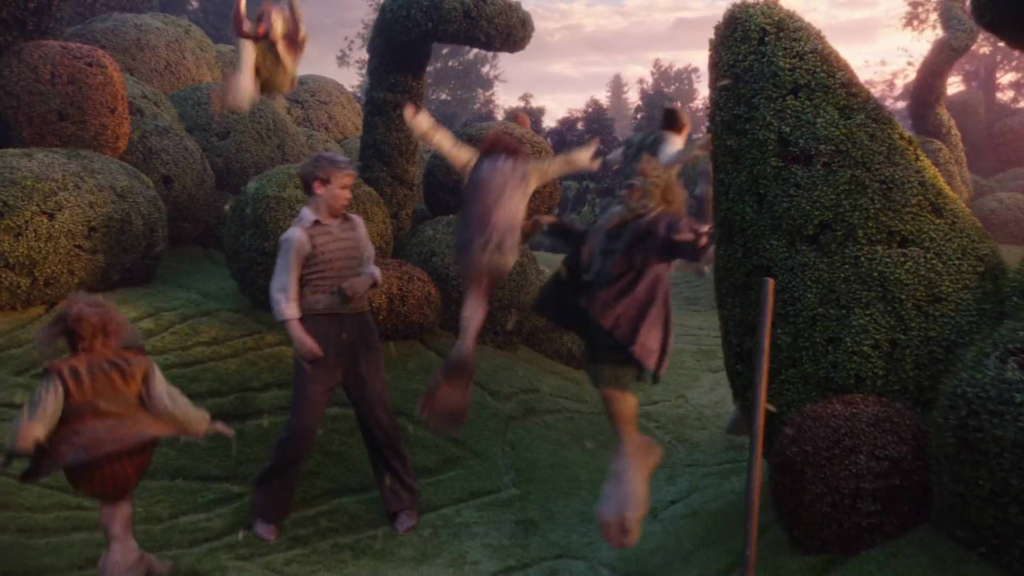
Coriakin leads Caspian, Lucy, Edmund, Eustace and Drinian into his mansion. Lucy asks what meant about making the dufflepuds invisible for their own good.
Coriakin: It seemed the easiest way to protect them. From the evil.
Edmund: You mean the Mist?
Coriakin: I mean what lies behind the Mist.
He unfurls a giant piece of parchment on the floor. A three-dimensional map of the sea appears on it. In the margins, clips from the first Narnia movie play. I guess this installment in the series wanted to refer back to the most profitable one as much as possible.
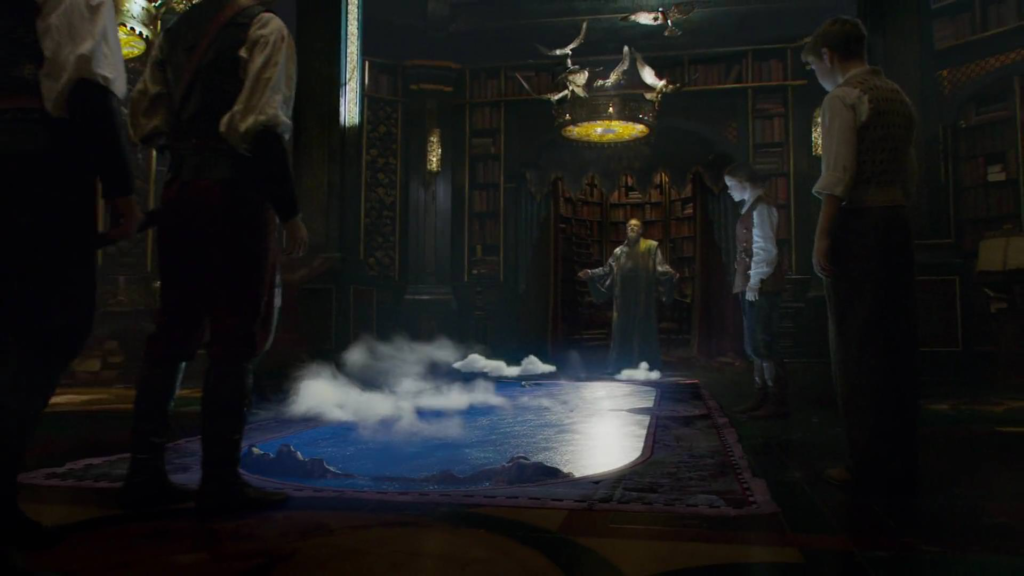
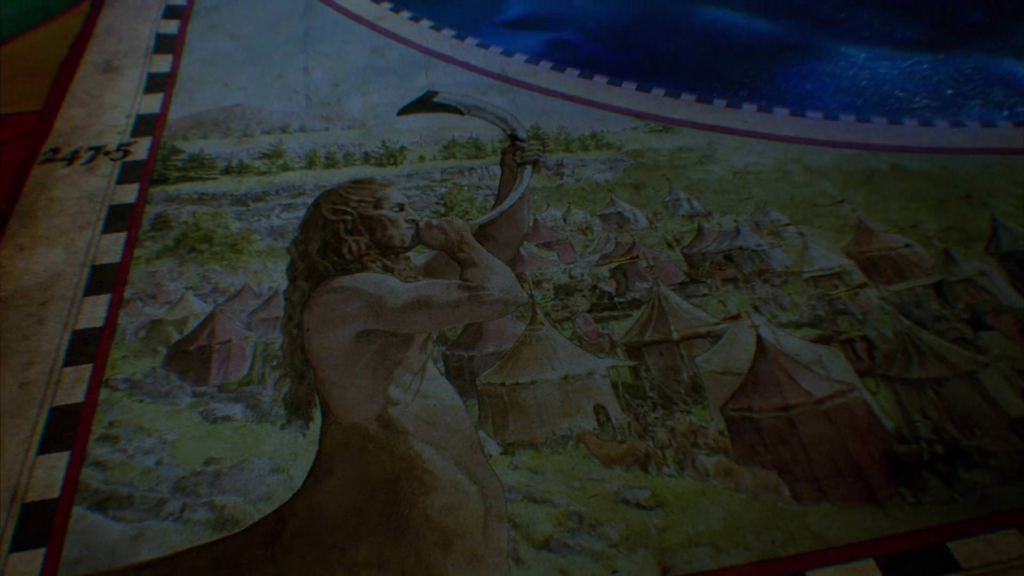
Eustace gets another well-conceived bit of character depth, automatically saying, “It’s quite beautiful,” then when his cousins stare at him in surprise, adding snippily “I mean for a make-believe map of a make-believe world.” Coriakin’s map zooms in on a weird looking cloud of dark smoke with a green glow emanating from it.
Coriakin: There is the source of your troubles. Dark Island. A place where evil lurks. It can take any form. It can make your darkest dreams come true. It seeks to corrupt all goodness, to steal the light from this world.
Lucy: Excuse me, sir, could you try to be less vague and more specific in your descriptions? If we’re going to defeat this thing, it’d help to know its precise goals, powers and limitations.
Just kidding. All she says is “How do we stop it?”
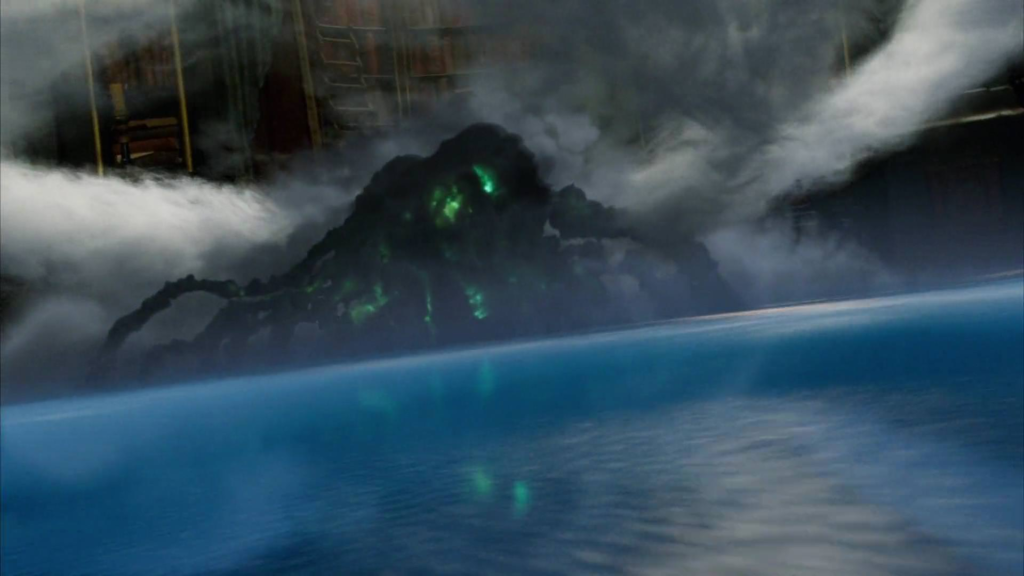
Coriakin: You must break its spell. (pointing to Edmund) That sword you carry. There are six others.
Edmund: Have you seen them?
Coriakin: Yes.
Caspian: The six lords? They passed through here?
Coriakin: Indeed.
Caspian: Where were they headed?
Coriakin: Where I sent them.
In the book by the way, Coriakin is a really relaxed, friendly character, something that makes for a humorous contrast to the aura of fear the invisible dufflepuds had built up around him. Seeing him changed into this grim, portentous prophet of doom annoys me, especially as the justification for the personality change is a really silly plot. The magical map shifts to show another, more ordinary island with a blue star hovering over it. Look, I know I’ve dismissed some of the lines in the other Narnia movies as cheesy, but the following spiel of Coriakin’s is such a cheese-o-rama that it feels like it was written by a fantasy-loving teenager. (I’m allowed to say that because I once was a fantasy-loving teenager.) “You must follow the blue star to Ramandu’s Island. There the seven swords must be laid at Aslan’s table. Only then can their true magical power be released. But beware. You are all about to be tested. Until you lay down the seventh sword, evil has the upper hand. It will do everything in its power to tempt you. Be strong. Don’t fall into temptation. To defeat the darkness out there, you must defeat the darkness inside yourself.”
I defy any serious actor to deliver that speech with a straight face![6]In all fairness, Bille Brown does manage to deliver it without hamming it up too much. But unlike some actors from the previous Narnia movies, neither does he make his lines sound better than they … Continue reading That is the way people who dislike fantasy think fantasy characters speak.
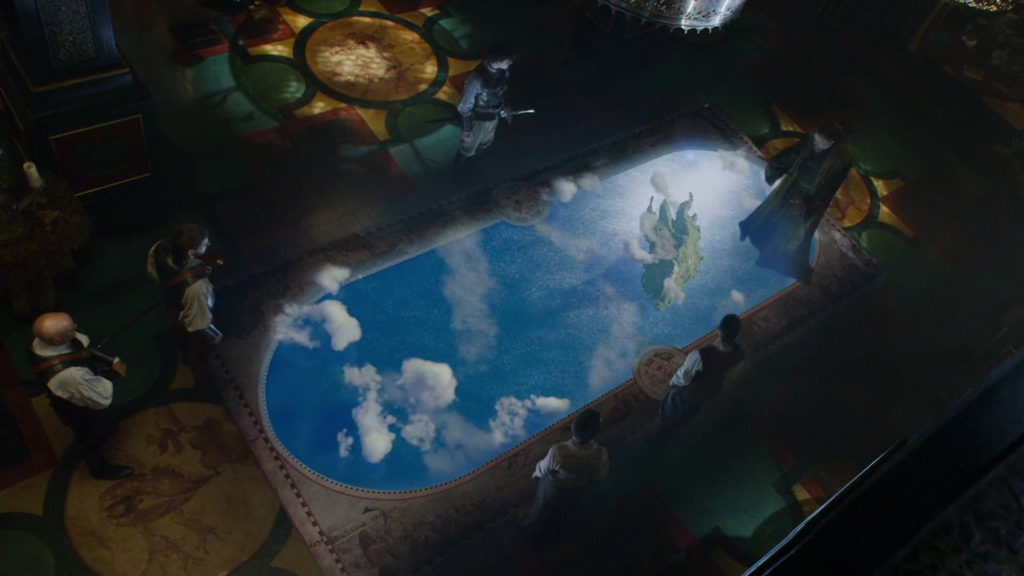
In the book, by the way, Coriakin magically creates a map of the islands the Dawn Treader has discovered on its voyage in a cool little scene, but he can’t make them a map of what’s to come. C. S. Lewis obviously denied him that ability since knowing what lay ahead in the voyage would ruin the story. I guess the movie’s Coriakin doesn’t totally ruin it. He only tells the voyagers about two of the islands they’ll encounter and doesn’t give very detailed descriptions of them or even very detailed directions for finding them. But that raises the question of why he doesn’t give them those things. However much the viewer wants to be surprised, the characters would want as much information as possible. Do they even think to ask?
Also, is it just me or does the whole collect-seven-swords-before-you-reach-your-final-destination-and-defeat-the-villain thing make it sound like this movie was written to be easily adapted into a video game? I remember when this film was still in preproduction and, figuring that they’d want to add some overarching threat or ticking time bomb to the book’s plot, I resigned myself to the inevitable and tried to guess what it could be. My first thought was that Caspian would need to find the seven lords or else the Telmarines would never accept his reign as legitimate. I rejected this idea since it made Caspian’s quest more selfish than noble[7]Well, you could argue it’s not selfish in that he’s a good ruler and it really is good for Narnia if he’s in charge. But it still feels more selfish than him just seeking the lords … Continue reading and some of the lords would be dead anyway. Then I thought that the villains from the Lone Islands could follow the Dawn Treader to seek revenge. I dismissed that idea as just being silly. Why would they risk sailing into dangerous uncharted waters on a quest for vengeance that would almost certainly fail? Oh well, I thought, surely professional screenwriters will come up with a better plot than I can.
I’m not sure my faith was rewarded.
Next Week: The Last Temptation of Lucy Pevensie
References
| ↑1 | In the book, it didn’t have a title by the way. |
|---|---|
| ↑2 | Or “hidden things visible” as the source material phrases it. |
| ↑3 | I know for a fact that it wasn’t a first draft since pages from a quite different version leaked on the internet at one point but that’s how it feels to me. |
| ↑4 | We’re getting to some of those. |
| ↑5 | That’s not a criticism. They’re supposed to look silly. |
| ↑6 | In all fairness, Bille Brown does manage to deliver it without hamming it up too much. But unlike some actors from the previous Narnia movies, neither does he make his lines sound better than they look on paper. |
| ↑7 | Well, you could argue it’s not selfish in that he’s a good ruler and it really is good for Narnia if he’s in charge. But it still feels more selfish than him just seeking the lords for their sakes. |
